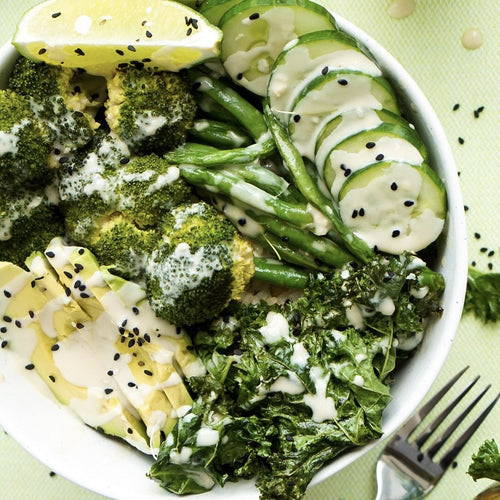want to go paleo? here's what you need to know
by team nuut

Intrigued to give paleo a go? Nutritional expert Ruth Sangster gives us the 101 for paleo-ing like a pro.
What is the paleo diet exactly?
RS: Foods consumed on the paleo diet are based on foods that are similar to what might have been eaten during the Palaeolithic era. The diet is based on how early hunter-gatherers obtained and consumed food. The paleo diet recommends the avoidance of processed food, refined sugars, legumes, dairy, grains, and cereals, and instead, advocates for grass-fed meat, wild fish, fruit, vegetables, nuts and seeds and healthy unsaturated fats.
The paleo diet excludes additives and empty calories and focuses on intake of quality protein, healthy fats and a wide range of fruits and vegetables.
What benefits will I experience on paleo?
RS: The paleo diet is popular for improving blood sugar levels, decreasing risk of heart disease and obesity and lowering blood pressure. It is also effective for weight loss, diabetes management and general wellbeing. Eating more vegetables increases your intake of essential vitamins, minerals and fibre that quickly and easily helps you meet your recommended 25-30g/day. There are anti-inflammatory benefits from plant nutrients in fruits, vegetables, oils, nuts and seeds and a reduction in carbohydrates that allows the body to burn stored fat for energy (as seen in the keto diet), which helps with weight loss. Also helping you lose weight is paleo’s reduced caloric intake, as well as the feeling of satiety thanks to the daily increase in good fats and protein.
What makes Paleo different from any other diet?
RS: Paleo, unlike most fad diets, is sustainable over long periods of time and promotes health, well-being and longevity. A lot of diets focus on a specific goal like weight loss, athletic performance or disease management. Unlike those diets, Paleo promotes positive gene expression, hormonal balance, and homeostasis, which lead to ideal general health, well-being, body composition, and athletic performance.
Can anyone go paleo?
RS: The paleo diet is suitable for anyone wanting to lead a healthier lifestyle. It's low levels of refined carbohydrates, processed foods, saturated fats and high sodium foods makes it ideal for those wanting to lose weight quickly but in a healthy and safe way. It’s also great for people with pre-existing health conditions, like weight issues, obesity, and type 2 diabetes.
Can you give a sample of a day’s food on the diet?
RS: For non-vegans, a typical morning could include eggs fried with organic butter with some bacon. For lunch, a big grilled chicken and homemade vinaigrette made with garlic, olive oil and lemon juice or raw, organic, unfiltered apple cider vinegar. In the afternoon a nuut, almonds, or bowl of berries with some coconut milk. Dinner might be delicious grass-fed roast beef with a sauce made from a reduction of homemade stock and the natural meat juices served with roasted carrots and beets.
for vegans, a smoothie bowl with paleo granola or fresh fruit, or cooked veggies and tofu scrambles is a great start to the day. At lunch a veggie-heavy salad including kale or mixed greens, cucumbers, tomatoes, carrots, radishes, alfalfa sprouts, and avocado with freshly squeezed lemon is lovely. For dinner, it could be a macrobiotic bowl (sans grains) or roasted veggie power bowl. If you eat fish, grill a fillet of wild or sustainable fish and add for protein.
What are your top 5 tips for paleo-ing for real results?
- Be sure to consume a wide variety of colourful fruit and vegetables as they are an important source of vitamins, minerals and dietary fibre, which act to maintain optimal health.
- Base your meals around a quality source of protein and a source of healthy fat. This will maintain satiety keeping you fuller for longer.
- Recreate your favourite snacks using healthy whole foods in order to avoid processed alternatives with hidden carbohydrates and sugar.
- Ensure adequate hydration by drinking plenty of water. Tea is also a good alternative to increase consumption of antioxidants.
- Pre-preparing snacks and meals for the week will remove the temptation to consume processed food alternatives and will encourage you to stick to your meal plan.
Can I resume eating a normal diet once I reach my weight goal?
RS: Paleo is not simply a weight loss diet, so it’s not recommended. Of course, you are free to live your life as you wish, but we strongly believe that if you give it enough time you won’t want to go back because you’ll see all the benefits and you’ll feel much better. Whilst following the diet only for a limited period of time is certainly good for your health, some of the benefits and weight loss will only happen much later in your journey once your gut is completely healed, your hormones are all balanced and you have plenty of the essential vitamins and minerals.